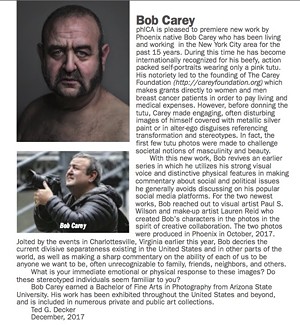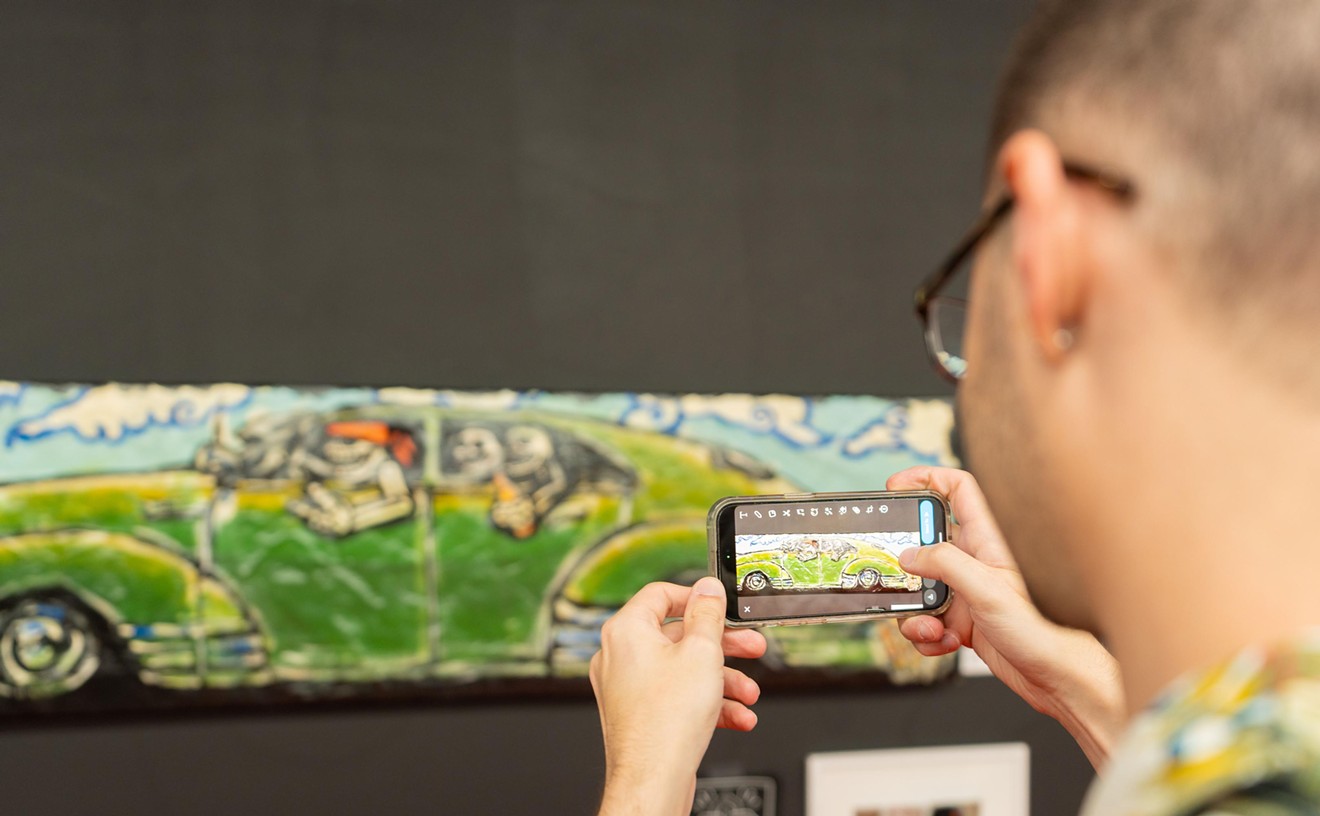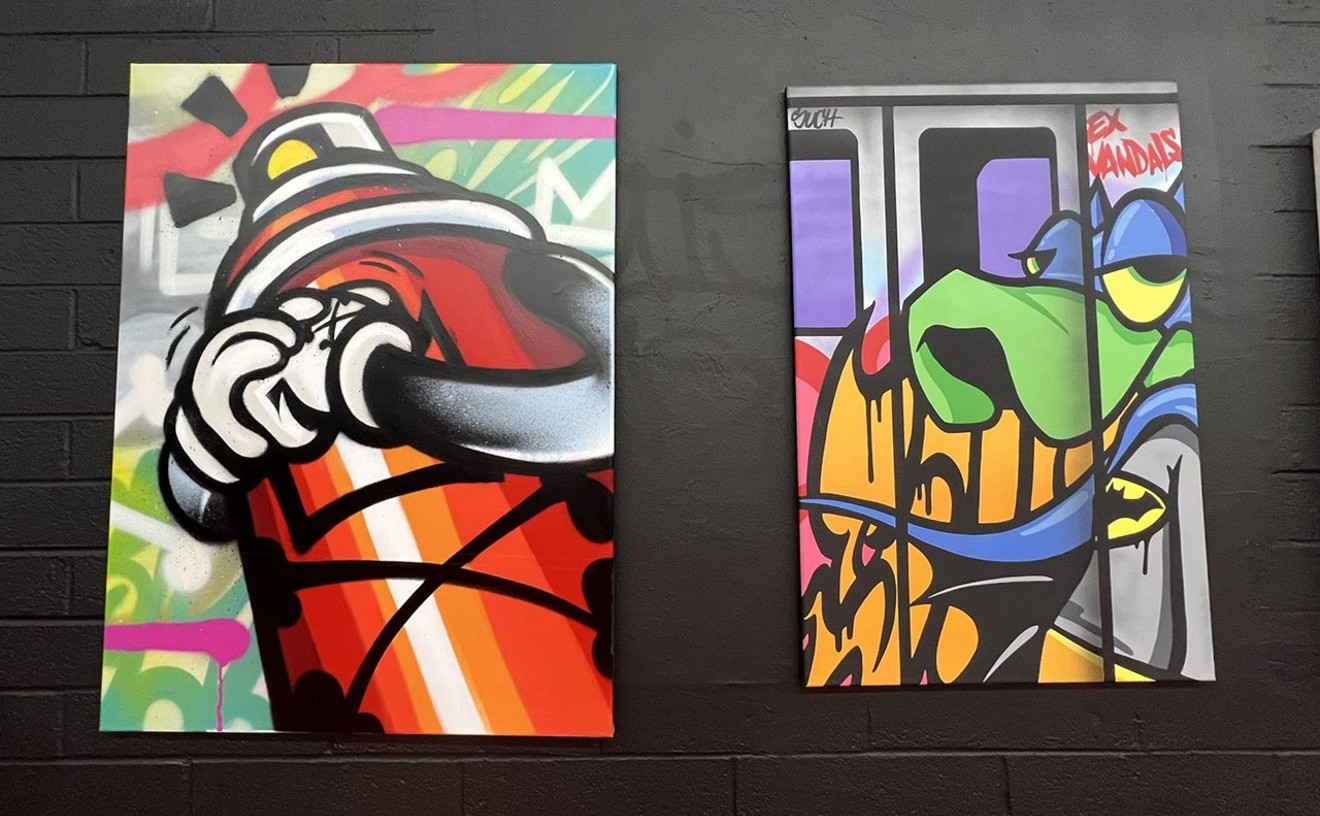The photograph is a self-portrait taken by New York artist Bob Carey in Brooklyn in 2004. It was shown at phICA on Friday, December 15.
Curator Ted Decker chose to include the photograph in an exhibition presented by phICA in a shipping container gallery in downtown Phoenix's Roosevelt Row. Decker co-founded phICA in 2009 with artists Eddie Shea and Greg Esser. He organizes phICA exhibitions and other programming.
Following Friday's art show, many took to social media calling for the exhibition to come down. Some suggested that Decker should resign.
The controversial piece was part of a three-photograph exhibition that also included two photographs created in Phoenix in October, in collaboration with visual artist Paul S. Wilson and makeup artist Lauren Reid, according to phICA exhibition materials.
It's worth noting that Decker — like Carey, Wilson, and Reid — is white.
In his curatorial statement, Decker noted that Carey's intention was to decry divisiveness in the aftermath of events in Charlottesville, Virginia, earlier this year.

Exhibition materials created by phICA for its Bob Carey exhibition.
Phoenix Institute of Contemporary Art
The blackface piece drew swift criticism from a variety of sources — including JJ Johnson, vice chairman for Black Lives Matter-Phoenix.
"There is nothing artistic or clever about using Black pain for an exhibit," he wrote in a public post on the phICA Facebook page. "This exhibit was cheap, lazy, and stupid. At a time when racism is making a national comeback, this shabby work is incredibly insensitive."
Neither Johnson nor Decker responded to Phoenix New Times' requests for comment.
Several members of the Arizona arts community also posted public comments on the phICA Facebook page — including Tyson Krank, whose work is featured on the large-scale Roosevelt map and directory located near the phICA shipping container gallery.
"I can’t even begin to explain how disappointed I am and this community is also very upset," Krank wrote, in part.
Other artists who expressed outrage over the exhibition on social media included Pete Petrisko, JB Snyder, and Tawny Kerr.
Modified Arts, a gallery located near the shipping container galleries, posted a response on its own Facebook page on Saturday afternoon, December 16. "Modified Arts stands with black artists," it read, in part.
Modified Arts also called for the exhibition to be closed. And that's exactly what happened.
On Sunday afternoon, December 17, Decker issued a public apology on the phICA Facebook page.
Decker began by writing that the images had been interpreted as racist and hateful by African-Americans and other community members. Then Decker explained that he was solely responsible for phICA curatorial decisions, and apologized for causing upset and pain.
"The images in question represent an error in judgement and my lack of awareness," Decker also wrote. "We will remove the work immediately, and it will not be shown on January First Friday."
Carey also issued a written apology that Decker posted on the phICA Facebook page late Sunday afternoon. "I am truly sorry if my recent work has offended any viewer," Carey wrote. Then he explained the intentions behind his work, including "psychological self-exploration and transformation."
Here's how Carey's apology described the images in the show: "The images ... were meant to address the Other within me; they are all aimed at evoking the humanity of any human countenance, especially those who have either been marginalized or demonized or ignored by society or history."
Shortly after those apologies were issued, Johnson put a public post on his own Facebook page. It noted that Johnson had talked at length with both Decker and Carey, and described both as "apologetic and contrite."
That post also included this recommendation: "I've urged all involved to use this episode to create opportunities for persons of color in art galleries. It does no good to banish people or to destroy them professionally." Johnson ended by rebuking the Phoenix arts community for staying mostly silent on the issue.
But about two hours later, Johnson added this "edit" for public view on his own Facebook page: "The curator is no longer apologetic. He has pivoted to place the onus for this mess that he created on persons of color. Alternatively, Mr. Decker seems to feel we are not sophisticated enough to understand the subject matter."
It's unclear what caused the change in Johnson's stance. On Tuesday, December 19, those Facebook comments were no longer visible to the public on his Facebook page.
This wasn't the first time Carey's blackface photograph was shown here in the Valley.
It was also part of Carey's solo exhibition at Fiat Lux gallery in Scottsdale, where it was not accompanied by the other two works included in Decker's First Friday show. The Scottsdale exhibition, which ran from October 5 to November 9, also included Carey's self-portraits in pink tutus, which were made to raise breast cancer awareness.
"It was in the Scottsdale show and it was received very well there as a single image," Carey told Phoenix New Times about the photograph by phone on Sunday, December 17. Fiat Lux has not responded to Phoenix New Times' request for information on responses to the piece.
Some people, including Jake Friedman, have taken to the phICA Facebook page to publicly to call for Decker's resignation. Friedman is the founder, director, and editor-in-chief for a Phoenix-based literary journal called Four Chambers. "The artwork never should have been shown in the first place," Friedman told Phoenix New Times by phone Sunday night.
"This is absurd," Friedman says. "It feels like a really naive display of white privilege."
Despite the recent outcry, not everyone agrees that the phICA exhibition should be closed.
Kathleen Vanesian, former Phoenix New Times art critic, posted on the phICA Facebook page to decry censorship and support freedom of artistic expression. "Bob Carey owes no one any apologies," Vanesian wrote after Carey's apology went up on the phICA Facebook page. "This is his art, for which he need not make any apologies. It's called freedom of speech."
Vanesian's stance was a rare exception in a steady stream of comments that shared a common thread: Blackface is racist, and it's not art.












